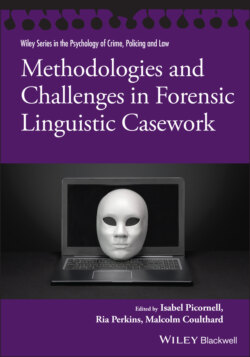Читать книгу Methodologies and Challenges in Forensic Linguistic Casework - Группа авторов - Страница 19
LOOKING FORWARD
ОглавлениеSeveral fundamental points come through repeatedly as one reads through the chapters. These provide insight into the interesting directions in which forensic linguistic analysis and casework is expanding.
Forensic linguistic casework does not occur in isolation. There is, and should always be, a close, two-way relationship between casework and research. Analysts’ ability to perform casework relies on a considerable amount of constantly evolving research involving multidisciplinary cooperation to conduct meaningful relevant research. To be truly effective, research has to be grounded in practical realities, which is where casework comes in. On the one hand, casework provides insights into real-life contexts, with its unknowns and unexpected complications. In the face of uncertainties, casework forces practitioners to apply their wide range of theoretical linguistic knowledge into critically exploring the situations they are confronted with, asking what might really be going on, instead of simply addressing the obvious question (Stepney & Thompson, 2020; see also Chapter 8 in this volume). Research, on the other hand, particularly inter and multidisciplinary research, moves forensic linguistics into exciting new areas, which can only benefit both practitioners and clients.
It is exciting to see the increase of complementary degrees in linguistics and disciplines such as psychology, law, and computer science, providing invaluable cross-disciplinary expertise in analyzing casework data. Such forensic linguistic casework also feeds into improving practices in other fields and into improving society as a whole. Legal linguistic studies improve understanding of how legal concepts are understood by lawyers and laypeople, facilitating the translation of legal texts in transnational organizations such as the European Union. Greater collaboration between linguists and computer scientists and statisticians improves machine-learning sophistication and accuracy rates with the incorporation of linguistic knowledge (Nini, 2018). Increased language awareness, generally among law enforcement and legal professionals, would go a long way toward highlighting the potential for discrimination in multilingual societies, reducing the linguistic misunderstandings that can result in miscarriages of justice.
These are exciting times for forensic linguists and forensic linguistics casework, and we hope that this book will contribute to a better understanding of the field.
